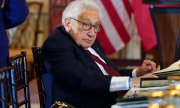Henry Kissinger: death of an exceptional politician
Henry Kissinger has died at the age of 100. Having fled to the US from the Nazis in 1938, he went on to become Secretary of State and security adviser to US Presidents Richard Nixon and Gerald Ford from 1969 to 1977. In 1973 he was awarded the Nobel Peace Prize for his efforts to end the Vietnam War. His policy of détente during the Cold War was widely praised. But he was also criticised, among other things for supporting the military coup in Chile. Obituaries reflect how controversial a figure he was.
Current world order loses a major pillar
Neatkarīgā wonders who will shape the world order now that Kissinger is gone:
“Kissinger was one of the most influential politicians, thinkers, strategists and tacticians at crucial turning points in world history. His role in ending the Cuban Missile Crisis and averting a global nuclear catastrophe was his greatest feat. Now, once again, the world is going through a very tense time. ... Is there such a 'sly fox' as Kissinger in our time? Will a new Kissinger step up if Donald Trump, who at least verbally refuses to support Ukraine, comes to power for a second time? What will the future of the aggressor Russia look like, and how will the war end? All we know is that Henry Kissinger, one of the pillars of the current world order, is dead.”
Brilliant, immoral and cynical
El País finds Kissinger's legacy questionable:
“The footprint Kissinger left on the world order is deep and controversial. His expertise and intellectual contributions deserve respect, but he also played an immoral and cynical role in the Vietnam War, the bombing of Cambodia and the promotion of military coups in Latin America, above all in Chile. ... In 1973, when Pinochet put a bloody end to Salvador Allende's democratic government, Kissinger was honoured with the Nobel Peace Prize. ... The ambiguity of his legacy is obvious. ... He was praised by his biggest critics and, of course, by tyrants such as Putin or Xi Jinping, whom he had advised. ... Small consolation for the anonymous victims of many of the policies he promoted.”
Much suffering to answer for
Murat Yetkin writes on his blog Yetkin Report:
“Kissinger was the living symbol of the 'old' new world order that was established after the Second World War. He was involved in almost every major international development, especially in the last quarter of the 20th century, and also in the bloodshed and human suffering that preceded those fancy peace ceremonies. Some would describe him as a hawk in the guise of a dove, but I don't think he even bothered himself with appearing like a dove; he was always a hawk with a deceptive smile on his face. He bears much of the responsibility for the problems that the world and we in Turkey face today.”
Not perfect, but a statesman all the same
Echo24 defends the deceased diplomat:
“He was the last of a series of statesmen who had the ambition to shape history. Unlike today's foreign policy makers who run like firefighters from one crisis to the next, Kissinger had a clear vision. He thus joined the ranks of movers and shakers such as Prince Metternich and Otto von Bismarck, both of whom he studied and admired. ... Kissinger understood that he often had to choose the second-worst option. ... That could mean making unpleasant compromises. There is much to criticise him for, but it's simply not true that he was a monster. Rather, he was the last, albeit imperfect, statesman.”
A productive final trip to China
Corriere della Sera praises Kissinger's open China policy, to which he remained faithful from the early 1970s to the end:
“In July of this year, Kissinger made an astonishing trip to Beijing: the centenarian used all his influence to re-establish dialogue between America and China, which seemed compromised after the incidents with Nancy Pelosi in Taiwan and the spy balloons. If the recent summit meeting between Joe Biden and Xi Jinping in San Francisco marked a pause in the escalation of tensions, then this is perhaps also partly thanks to the trip made by Kissinger, the 'old statesman' whom the Chinese have always respected.”
No wishful thinking
Non-ideological realism is a rare quality in today's politics, the pro-government Magyar Nemzet believes:
“With Kissinger's death, a large part of realistic America has also disappeared, to the great detriment of the world. An America that did not chase after the mirages of the idealists and that, although it was tough on the enemy, did not want to send those who disagreed with it to correction centres. The contrast with today could not be greater. ... Kissinger was no saint, he made mistakes and even committed crimes, he became one of the controversial Nobel Peace Prize winners. But to the very end he navigated world politics without ideological wishful thinking.”

